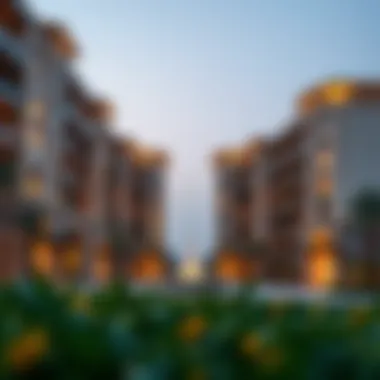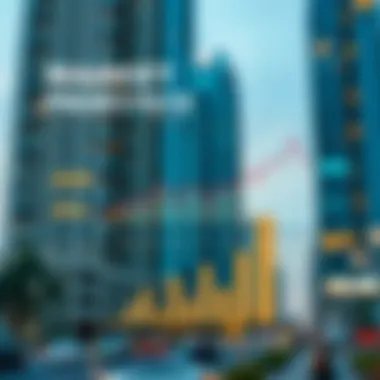Al Qamar Real Estate: Insights into Dubai's Market


Intro
Navigating the complex waters of Dubai's real estate market can feel like trying to find a needle in a haystack. This lively metropolis, known for its towering skyscrapers and luxurious lifestyle, is also home to a variety of real estate players. One of these key players is Al Qamar Real Estate, a company that has been making waves in the industry. Understanding its role, strategies, and property offerings can provide valuable insights for anyone looking to invest, rent, or simply get a feel for the market.
As we chart this journey through Al Qamar's landscape, it’s essential to break down the key areas that matter most to you. Let’s dive in and explore the trends shaping the current market, identify the types of properties available, and understand what makes Al Qamar a notable contender in Dubai's ever-evolving real estate scene.
Prelude to Al Qamar Real Estate
Al Qamar Real Estate stands as a significant player in Dubai's ever-evolving property market. Located in a city synonymous with architectural innovation and luxurious living, this company has managed to carve a niche for itself. It’s not just about bricks and mortar; it’s about understanding the changing dynamics of an environment eager for growth and investment.
The essence of Al Qamar Real Estate lies in its commitment to quality and customer satisfaction, integral attributes that resonate well with the discerning real estate investor, home buyer, real estate agent, and property manager. Having a solid grasp on how Al Qamar operates—not just its portfolio but how it engages with the market—serves as a foundation for understanding contemporary real estate practices in Dubai.
Key Elements to Consider
- Market Expertise: Al Qamar has developed a keen insight into local trends and international market demands. This strategic positioning helps in tailoring offerings that meet buyers' and investors' needs.
- Customer-Centric Approach: Expectations are high in Dubai. Al Qamar prioritizes customer needs, engaging proactively to provide tailored solutions throughout the property buying or renting process.
- Diverse Portfolio: From residential to commercial, Al Qamar manages a variety of properties suited to different segments, reflecting a flexible approach that addresses varied real estate needs.
In this article, we will seek to explore various aspects of Al Qamar's operations. This includes its history, current market positioning, and future outlook, all while gaining insights into the strategic choices that set it apart from competitors in a crowded market.
"Real estate is an art; it's about painting a picture that blends people's dreams with solid returns on investment."
Understanding Al Qamar Real Estate not only illuminates the company’s practices but offers valuable perspectives on Dubai’s property landscape as a whole. Both potential investors and renters can benefit from being informed about the nuances of markets underpinned by significant players like Al Qamar.
The Evolution of Real Estate in Dubai
The real estate scene in Dubai has undergone remarkable transformation over the past few decades. Understanding this evolution is crucial for anyone interested in Al Qamar Real Estate or Dubai’s property market in general. This section will highlight the landmark changes that have shaped the property landscape, analyzing how historical events, economic factors, and consumer preferences have influenced the market.
Historical Context
Dubai’s journey from a modest fishing village to a glittering metropolis is nothing short of extraordinary. The discovery of oil in the 1960s acted as a catalyst for rapid development. With the oil boom came investments in infrastructure, leading to the development of roads, schools, hospitals, and, importantly, housing. The urbanization started at a swift pace, giving rise to iconic structures like the Burj Khalifa and the Palm Jumeirah.
As the city gained international recognition, the real estate sector began to open up to foreign investors. In 2002, the UAE government relaxed regulations, allowing non-nationals to buy properties in designated areas. This shift was pivotal in attracting foreign capital and ushering in a new era of investment. The allure of Dubai’s tax-free status, coupled with its strategic location, made it a sought-after destination for real estate enthusiasts globally.
Recent Trends
The last decade has seen a whirlwind of changes, most notably in the luxury real estate market. Trends indicate a growing preference for sustainability and technology-driven homes. Buyers today are not just looking for a roof over their heads but are also conscious of energy efficiency and smart home features. Al Qamar Real Estate is positioned well to cater to these modern preferences by incorporating eco-friendly materials and cutting-edge technologies into their properties.
Moreover, there has been a noticeable shift towards rental properties, especially since the pandemic. Many individuals and families are opting to rent rather than buy, fueling demand for well-located rental units. Al Qamar's offerings in this segment demonstrate an understanding of market dynamics and client needs.
This evolution in real estate in Dubai signifies more than just a change in property sales; it represents the adaptability of the market to meet the needs of an increasingly diverse population. Buyers and investors should keep a close eye on these trends, as they can significantly influence investment decisions and value appreciation in the coming years.
Al Qamar's Market Position
Understanding the market position of Al Qamar Real Estate is crucial for anyone interested in foreign or domestic investments in Dubai. This section delves into how Al Qamar navigates the competitive landscape, highlighting its strategic advantages and the factors influencing its market strength.
Competitive Analysis
When it comes to real estate, competition is as fierce as it gets in a bustling city like Dubai. Al Qamar Real Estate has carved out a niche for itself by focusing not only on high-quality residential properties but also on diverse commercial spaces. This strategy allows the company to tap into multiple revenue streams. Their innovative approach contrasts with other players in the market, who may focus primarily on either residential or commercial, thus offering a unique value proposition to investors and homebuyers alike.
Looking into the competitive analysis, one can see a variety of factors that enhance Al Qamar's visibility. The company leverages both traditional and digital marketing strategies effectively. Additionally, the integration of cutting-edge tech in property management systems has streamlined operations and increased customer satisfaction. Renting a property or buying it has been made easier due to these advancements, which provides an edge over competitors.
Moreover, Al Qamar’s commitment to sustainability has made it stand out. It's not just about profits; the emphasis on green building practices means the company aligns with global trends towards environmental awareness, a critical consideration for modern investors.
"In the real estate game, it’s not enough to just build well. You have to market smarter, always looking at the trends!"
Market Share Insights
Grasping market share insights of Al Qamar Real Estate offers a window into its operational success and future sustainability. The company's growth trajectory has been noteworthy based on its performance in the last few years. It controls a significant portion of the Dubai property market, which is indicative of its strong brand and customer trust.
The data shows that Al Qamar holds approximately 12% of the residential market and about 15% of the commercial sector. This positions the company as a key player amongst both buyers and investors, making it a reliable choice for those seeking long-term investments.
However, it is important to consider the fluctuation trends in the market. With economic shifts and evolving consumer preferences, Al Qamar must navigate these waters carefully to maintain its position. Monitoring indicators like housing demand and rental yields can give potential investors a clearer picture of where Al Qamar stands in terms of market share.
Property Portfolio of Al Qamar Real Estate
The property portfolio of Al Qamar Real Estate is a tapestry woven with diverse offerings that cater to a wide range of clientele in Dubai's competitive market. Recognizing the importance of such a portfolio not only helps investors understand potential returns but also aids home buyers, renters, and even real estate agents in navigating choices suited to their unique needs. A robust property portfolio positions Al Qamar as a significant player in the real estate sector, reflecting its adaptability to market dynamics and consumer demands.
Al Qamar’s portfolio is crucial as it illustrates the company's expertise in curating spaces that meet lifestyle demands and economic trends. With a well-rounded mix of residential properties, commercial spaces, and luxury developments, it highlights the thorough understanding of market segments. The objective goes beyond just selling properties; it also involves creating communities and fostering relationships. This approach ensures sustainability in operations and trust within the market.
Residential Offerings
Al Qamar takes pride in its residential offerings, which are a focal point of their portfolio. The company presents an array of options, from cozy apartments to sprawling villas that mirror the vibrant lifestyle of Dubai. Properties are tailored to varying budgets and preferences, making them suitable for first-time buyers and seasoned investors alike. One aspect that stands out is the emphasis on community living; many residential developments are strategically placed near schools, parks, and essential amenities.
This accessibility enhances the overall living experience, attracting families and young professionals. Furthermore, the modern architectural designs paired with sustainable practices aim to meet the aspirations of today's environment-conscious buyers. As such, potential residents can not only find a place to call home but also a community to thrive in.
Commercial Developments
The commercial sector of Al Qamar's portfolio reflects the dynamic nature of Dubai's economy. With a keen focus on business districts and growth areas, Al Qamar's commercial properties attract companies ranging from startups to established corporations. These developments include office spaces, retail outlets, and mixed-use properties, designed to promote synergy amongst businesses.
Here, the emphasis is put on creating environments that encourage collaboration and innovation. Coupled with strategic location choices, these commercial developments often offer prime visibility and accessibility, making them alluring for potential tenants. Al Qamar ensures that their commercial offering caters to evolving business needs, all while adhering to regulatory standards and sustainability commitments.
Luxury Properties
When discussing Al Qamar, one cannot overlook its foray into luxury real estate. The luxury properties segment is an embodiment of elegance and sophistication, featuring some of the most exclusive listings in Dubai. These properties range from penthouses with breathtaking views to villas ensconced in picturesque locations, each exuding unique charm and amenities.
Potential buyers are not just purchasing a property; they are investing in a lifestyle. Al Qamar places great importance on providing top-notch finishing, advanced technology integrations, and bespoke services that appeal to the affluent market. This meticulous attention to detail reinforces Al Qamar’s reputation as a purveyor of high-quality living spaces, ultimately uplifting the standard for luxury real estate in Dubai.
It’s not just about building properties for Al Qamar Real Estate; it’s about crafting exceptional experiences.
The Investment Landscape
The investment landscape in real estate is a crucial element for anyone looking to dive deeper into the complexities of property acquisition and development. Understanding this landscape in the context of Al Qamar Real Estate is essential for investors, home buyers, and even property managers who seek to navigate Dubai's often turbulent yet rewarding market.
Why Consider the Investment Landscape?
The investment landscape tells a story beyond mere numbers; it reflects the health and viability of the real estate market. It encompasses the various factors that influence property values, market demand, and various opportunities ripe for investors willing to venture into Dubai's versatile property sector. With insights into economic trends, demographic shifts, and consumer behavior, stakeholders can make informed decisions that could lead to lucrative returns.
"Understanding the investment landscape isn't just about where to put your money; it's about understanding the ecosystem in which those investments will thrive."


Understanding ROI
Return on Investment (ROI) is a term that pops up often in discussions about real estate investments. It's a metric that allows investors to evaluate the efficiency of their investments. In the case of Al Qamar, calculating ROI requires a multi-faceted approach, where various elements come into play:
- Purchase Price vs. Market Value: Knowing what you pay against what you're likely to earn through rent or appreciation is fundamental. If a property is overpriced, its ability to yield a good ROI diminishes.
- Operational Costs: These are expenses like maintenance, property management fees, and taxes. A clear understanding of these helps in calculating the true return.
- Market Trends: Are property values rising or faltering? Knowing market trends helps investors estimate future returns, thus enhancing their decision-making process.
For many investors, a good rule of thumb is aiming for a ROI of 10% or more, although this may vary greatly depending on market conditions and property types. The higher the ROI, the more attractive the investment. However, it should be remembered that higher returns often come with higher risks.
Investment Opportunities
The opportunities that lie within Al Qamar's real estate offerings are as varied as they are promising. Investors can explore several avenues:
- Residential Properties: With the ever-growing population in Dubai, residential properties often find a steady stream of demand. This demand translates into consistent rental income and eventual appreciation of property values. Investing in neighborhoods with developmental plans by Al Qamar can be particularly lucrative.
- Commercial Developments: Here, the commercial segment offers a robust path for investment. Properties that cater to businesses—from retail spaces to office buildings—hold the potential for high yields. Companies looking to establish themselves in Dubai often seek out well-placed commercial spaces, and securing these properties can lead to excellent rental returns.
- Luxury Properties: The ultra-luxury segment is thriving, attracting both foreign and local buyers who see value in high-end properties. For investors, luxury properties not only make a statement but also promise significant returns, given their limited availability and high demand.
In summary, navigating the investment landscape with an acute awareness of ROI and investment opportunities equips investors and buyers with the tools needed for successful dealings in Dubai's ever-evolving real estate market.
Regulations and Compliance
Understanding the regulations and compliance aspects of Al Qamar Real Estate is vital for anyone looking to engage with the Dubai property market, be it buyers, investors, or renters. The legal framework shapes the landscape of real estate transactions, ensuring that operations adhere to established laws and standards which, in turn, helps to protect all parties involved.
Legal Framework
The legal framework governing real estate in Dubai is intricate and multifaceted. It’s not just about having laws on the books; it’s about how these regulations interact with everyday operations in the property market. Dubai's real estate is regulated primarily by the Dubai Land Department (DLD), which is responsible for overseeing property registration, licensing, and ensuring compliance with real estate laws.
Some key laws include:
- Law No. 7 of 2006: This law regulates property ownership in Dubai, allowing both UAE nationals and expats to buy and sell property in designated areas.
- Law No. 8 of 2007: This focuses on the establishment and management of property management services, covering developers, landlords, and property managers.
These laws create a framework that fosters a secure environment for property transactions. By aligning property dealings with regulatory standards, buyers can be sure they are making informed decisions. The DLD also plays a critical role in dispute resolution, which further protects investors and enhances market confidence.
Buyer Protection Laws
When it comes to buyer protection in Dubai's real estate arena, regulations are designed to provide a safety net for investors. For potential purchasers, knowing that there are laws in place to safeguard their interests is essential. Buyer protection laws ensure that transactions are transparent and fair. This includes the right to have a property delivered on time and in the promised condition, along with assurances against hidden defects in property.
Some notable protections include:
- The Escrow Law: Implemented to ensure that buyer funds are secure during the purchase process. Developers are required to deposit buyer payments into escrow accounts monitored by third parties.
- RERA Regulations: The Real Estate Regulatory Agency (RERA) sets the standards for the conduct of real estate businesses and enforces rules to protect buyers from fraud. They also oversee real estate agents to ensure proper conduct and ethical business practices.
These regulations not only protect buyers but also enhance the overall credibility of the Dubai real estate market.
“In a crowded marketplace, compliance with regulations is not just a good practice; it’s a competitive advantage.
Navigating the Buying Process
Navigating the buying process for real estate in Dubai can be akin to finding your way through a labyrinth. It’s essential for both first-time buyers and seasoned investors to understand the various components involved. This section will peel back the layers and spotlight the intricate yet vital steps that can facilitate a smooth property acquisition journey. Proper navigation not only helps in securing the best deal but also ensures compliance with local regulations, ultimately contributing to a successful investment experience.
Steps to Purchasing Property
Purchasing property isn’t merely about exchanging cash for keys; it’s a multifaceted process that requires careful planning and execution. Here are the steps that prospective buyers should follow:
- Research and Define Your Requirements: Figure out what you’re looking for—your needs, preferences, and budget. This acts as your compass, guiding every decision.
- Gather Financial Documentation: Assess your financial standing. Lenders will request documentation like income statements, credit history, and bank statements. Having this ready simplifies things greatly.
- Get Pre-Approved for a Mortgage: If you’ll be financing your purchase, obtain pre-approval from a bank or financial institution. This provides leverage in negotiations and gives you a clear idea of your budget.
- Engage a Reliable Real Estate Agent: Having an expert in your corner can help in identifying properties that align with your goals. They bring local market expertise and negotiation skills to the table.
- Property Viewings: Schedule visits to the properties that catch your eye. This step allows you to physically assess the condition and amenity offerings.
- Make an Offer: Choose a property and proceed to make an offer. Be realistic, yet competitive. Your agent’s insight can be invaluable here.
- Draft a Sales Agreement: A legally binding document that outlines the terms of the sale. It includes pricing, contingencies, and timelines, all of which should be carefully considered.
- Complete Due Diligence: Conduct property inspections and clarify any legalities or encumbrances. This is your chance to uncover any potential issues.
- Finalize Financing: Once the offer is accepted, finalize your mortgage and prepare for the closing process.
- Closing the Deal: This final step sees the transfer of ownership. All documents are signed, and the keys are handed over, marking the culmination of your efforts.
Role of Real Estate Agents
Real estate agents play a pivotal role in the property buying process. Their expertise can be the difference between a seamless transaction and a bumpy ride. Here are some key functions they perform:
- Market Insight: Agents offer comprehensive knowledge about the local market, helping buyers understand the movement of prices and trends.
- Negotiation Skills: They are trained negotiators, capable of securing favorable terms and potentially saving you money, thanks to their understanding of market dynamics.
- Networking: Agents often have extensive networks that can provide access to off-market listings or upcoming developments before they are publicly available.
- Administrative Support: Navigating paperwork and legal formalities can be daunting. Agents manage this on your behalf, ensuring compliance with regulations and timely completion of documentation.
- Guidance Throughout the Process: From initial search to closing, agents act as guides. They educate buyers about their rights, inform them about obligations, and ensure all steps are communicated clearly.
Hence, developing a trusting relationship with a real estate agent can lead to more informed decisions and a significantly less stressful buying experience.
Rental Market Dynamics
Understanding the dynamics of the rental market is crucial for anyone engaged in Dubai's real estate scene, particularly when considering Al Qamar Real Estate. This segment provides insight into current trends and the legal framework surrounding renting, which are pivotal for renters and investors alike. The rental market serves as a vital barometer for property value and investment potential, shaping decisions made by property managers and landlords.
The rental market's health can often predict the overall sentiment in the real estate landscape, and trends within it are indicative of broader economic conditions. Whether someone is a landlord seeking tenants or a renter searching for the perfect home, being informed about key aspects falls nothing short of essential.
Current Rental Trends
Dubai's rental market, particularly in the context of Al Qamar Real Estate, is characterized by several notable trends. High occupancy rates at various residential properties indicate a sustained interest from expatriates and local residents. According to recent reports, some neighborhoods have seen rental prices stabilize or even increase due to limited supply.
- Shift Towards Family-Oriented Properties: There has been a significant uptick in demand for larger multi-bedroom homes as families look for more space. This demand is also influenced by current remote work trends, where families are prioritizing comfort and functionality over proximity to business centers.
- Luxury Rental Market Growth: Properties equipped with high-end amenities have found favor among affluent renters. Areas that previously might have catered primarily to buyers are now seeing a rise in luxury rentals, establishing a niche within the market.
- Technological Integration: With the rise of PropTech, landlords are using innovative technology platforms to manage rentals more efficiently, offering virtual house tours, and catering to tenant needs in real-time.
These trends illustrate not only current preferences but also underline changes in lifestyle that impact the rental market dynamics.
Tenant Rights and Responsibilities
For anyone diving into the rental sector, understanding tenant rights and responsibilities is more than just a cursory glance at the lease agreement. The laws in Dubai are structured to protect both tenants and landlords, ensuring a balanced relationship that fosters a fair renting environment.
Tenants in Dubai are entitled to several rights, which include but aren’t limited to:
- Security of Tenure: Tenants are protected from arbitrary eviction, as landlords must adhere to specific legal protocols before terminating a lease.
- Maintenance Responsibilities: While tenants are expected to keep properties in good condition, landlords are responsible for ensuring that the property meets all safety standards and is habitable at the start of the tenancy.
- Right to Privacy: Tenants have the right to privacy within their rented homes, meaning landlords must give adequate notice before entering a property for inspections or repairs.
However, with these rights come responsibilities that tenants must uphold:
- Timely Rent Payments: Meeting rental payment deadlines is crucial. Late payments can lead to further legal complications.
- Adherence to Lease Terms: Any alterations or sub-letting must be approved by the landlord as stipulated in the lease agreement.
- Respecting Neighbor Relations: Ensuring that noise levels and other disturbances do not infringe on the rights of neighbors is also a responsibility that tenants must bear.
With a clear understanding of these aspects, both tenants and landlords can navigate the rental market landscape more effectively, fostering an environment of mutual respect and understanding.
Future Outlook for Al Qamar Real Estate
The future landscape for Al Qamar Real Estate is not just a roadmap; it’s a mosaic of potential opportunities and strategic planning. As the real estate sector in Dubai continues to evolve, understanding the upcoming trends and initiatives can be a game changer for investors, buyers, and market analysts. Examining the future of Al Qamar reveals not only the company’s positioning in the market but also highlights their adaptation to the shifting dynamics of consumer needs and environmental considerations.
Forecasting Market Trends
To navigate the murky waters of a fluctuating market, one must look ahead. Forecasting market trends shows the trajectories that Al Qamar can leverage to maintain its competitive edge. With data driven analysis, trends such as urbanization, demographic shifts, and technological integration come into play.
- Urbanization: As the population in Dubai flourishes, the demand for housing and commercial spaces will likely surge. Projects focusing on mixed-use developments are expected to gain traction, catering to urban living preferences.
- Technological Integration: The incorporation of technology into new builds is becoming standard. Innovations like smart homes and automated facilities will not only enhance living experiences but also attract tech-savvy investors and buyers.
- Sustainability Focus: With a global push towards greener living, properties that prioritize sustainability, perhaps through energy-efficient systems, are becoming increasingly valuable. Al Qamar will need to address this shift proactively.


"The future isn't just something that happens; it's something we create together."
— Author Unknown
These observations will serve as guideposts for Al Qamar Real Estate, helping to shape projects and marketing strategies tailored to both current and future buyer demands.
Strategic Growth Initiatives
In the face of changing market dynamics, strategic growth initiatives are essential for any real estate firm aiming for longevity. Al Qamar has begun to outline certain initiatives intended to seize future opportunities, focusing on both market penetration and expansion.
- Diversification of Property Offerings: By expanding their portfolio beyond luxury residential properties to include more affordable units, Al Qamar can successfully capture different segments of the market. This diversification can help buffer against economic downturns.
- Localized Marketing Strategies: As buyers become more discerning, localized and personalized marketing strategies will likely take center stage. This gives buyers a sense of authenticity and connection to the community they are investing in.
- Strong Partnerships: Collaborating with local governments, potential developers, and community organizations can bolster Al Qamar’s standing in the market. These partnerships can enhance credibility and open doors to new projects.
- Investment in Research and Development: Constantly analyzing market data and consumer preferences will help Al Qamar adapt its strategies in real-time, ensuring they stay ahead of the curve.
Sustainability in Real Estate
Sustainability in real estate has become a cornerstone of modern development, especially in a rapidly expanding city like Dubai. The importance of adopting sustainable practices is evident not just from an environmental perspective, but also from economic and social viewpoints. As the demand for properties increases, so does the responsibility for developers and investors to implement sustainable strategies in their projects. This need isn't merely a trend; it's gradually becoming a standard expectation among buyers, renters, and stakeholders.
The benefits of embracing sustainability in real estate are manifold. Firstly, properties built with eco-friendly practices often have lower operating costs, as they utilize energy-efficient technologies and materials. This can translate to savings on utility bills for homeowners and renters, making such properties highly desirable. Additionally, sustainable developments tend to attract conscientious buyers, who are willing to pay a premium for green features.
Moreover, sustainability isn't just about energy efficiency; it encompasses the entire lifecycle of a building. From the materials used in construction to the management of waste and resources post-occupancy, every aspect of a property can reflect a commitment to environmental stewardship. This holistic view enhances a property’s long-term value and its contribution to the community.
"A green building is not just an investment in the environment; it's an investment in our future."
As Al Qamar Real Estate positions itself in this evolving landscape, adopting sustainable practices could be key in distinguishing itself from competitors. Potential buyers are looking closely at these practices, searching for assurances that their investments will not only be prosperous today but also sustainable for generations to come.
Green Building Practices
Green building practices are vital in mitigating the environmental impact of construction and development. Al Qamar Real Estate is poised to benefit greatly from integrating these methods into their projects. This involves several strategies, such as using sustainable materials, optimizing energy efficiency, and designing buildings with natural ventilation.
Some notable green building practices include:
- Use of Renewable Materials: Sourcing materials from sustainable resources minimizes the carbon footprint.
- Energy Efficient Systems: Installing solar panels and energy-efficient HVAC systems cut down on energy consumption, resulting in lower utility costs.
- Water Conservation Measures: Implementing rainwater harvesting systems can significantly reduce the dependency on municipal water supplies.
By incorporating these practices, Al Qamar not only aims to enhance its portfolio but also foster a culture of sustainability among its clients and investors.
Environmental Regulations
Navigating environmental regulations is a crucial aspect of the real estate market in Dubai, especially regarding sustainability. The emirate has set a series of laws and guidelines to ensure that construction and development do not harm the environment. These regulations are designed to encourage best practices in building design and site management, focusing on reducing waste and minimizing energy use.
The UAE's Green Building Code is a significant regulatory framework that provides guidelines for energy efficiency and sustainability in construction practices. Developers, including Al Qamar Real Estate, must adhere to these standards to ensure projects are compliant.
Furthermore, regulatory bodies monitor the development to promote sustainable practices. Non-compliance can result in fines or the revocation of permits, which serves as a strong incentive for developers to prioritize sustainability.
For Al Qamar Real Estate, aligning with these regulations not only secures legal compliance but also enhances its reputation in the market as a responsible and forward-thinking developer. Buyers are increasingly aware of these regulations and often factor them into their purchase decisions.
Technology's Role in Real Estate
In today's property market, technology is not just a tool; it has become the backbone of effective real estate management and marketing. For Al Qamar Real Estate, harnessing the latest technological advancements is key to maintaining a competitive edge in Dubai's fast-paced environment. Understanding these developments can provide both seasoned investors and first-time homebuyers with a clearer perspective on how to navigate this complex landscape.
From virtual reality home tours to sophisticated property management software, technology streamlines processes and enhances decision-making. It enables stakeholders to obtain critical market data quickly, ultimately promoting informed choices.
Emerging Technologies
Emerging technologies such as artificial intelligence (AI) and machine learning are revolutionizing how real estate transactions are conducted. AI tools can analyze vast amounts of data—to spot trends before they become obvious to human analysts. This proactive approach can lead investors to prime properties at the right price.
Moreover, smart home devices are increasingly appealing to buyers. Homes equipped with smart technology not only attract a niche market of tech-savvy consumers but can also command higher rental or resale prices, as they offer added convenience and energy savings.
The adoption rate of smart technology has been rising steadily, making it a vital consideration for both developers and buyers alike.
Important Emerging Tech Considerations:
- Cost vs. Value: While implementing technology can be costly initially, the long-term benefits—such as enhanced property management and energy savings—often justify the expenses.
- Data Privacy: As smart homes gather data, ensuring user privacy and security becomes a pressing concern.
PropTech Innovations
PropTech—which stands for property technology—encompasses a broad array of innovative software solutions specifically designed for the real estate industry. Al Qamar Real Estate leverages these technologies not only for property transactions but also for marketing and customer engagement.
A noteworthy example is the use of blockchain technology for property transactions, allowing secure and transparent record-keeping. This reduces the scope for fraud and expedites the sales process, benefiting buyers and sellers alike.
Furthermore, virtual and augmented reality applications have become increasingly popular. They offer prospective investors the ability to take virtual tours of properties without stepping outside. This is particularly advantageous in a broad market like Dubai, where international buyers might be exploring options from halfway around the world.
"Utilizing technology, it is easy to attract, engage, and retain customers while offering exceptional service that meets modern expectations."
Benefits of PropTech:
- Enhanced Visibility: Listings can reach a wider audience through online platforms.
- Efficient Management: Automated tools facilitate more efficient property management.
- Customer Insights: Data analytics provide insights into buyer preferences, enabling tailored marketing approaches.
In summary, technology’s role in real estate is indispensable, particularly for a thriving entity like Al Qamar Real Estate. As the market continues evolving, staying abreast of technological trends will allow real estate stakeholders to maximize their investment and improve their property management strategies.
Marketing Strategies for Real Estate
In the fast-paced world of real estate, especially within the vibrant landscape of Dubai, effective marketing strategies are not just beneficial; they're essential. These strategies bridge the gap between potential buyers and properties, making them a pivotal element for success in this competitive field. Al Qamar Real Estate recognizes the value of nuanced marketing, utilizing it to enhance visibility and foster client relationships. This section delves into the imperative tactics employed in real estate marketing, highlighting their significance for buyers, investors, and agents alike.
A strategic approach to marketing allows real estate firms to not only showcase properties but also to establish their brand credibility. In a city like Dubai, where the property market brims with options, standing out can be as crucial as the properties themselves. With the right strategy, firms can craft tailored messages that resonate with various segments of the market, addressing the unique needs of each group.
- Targeted Outreach: Understanding the specific needs of different demographics helps in forming focused marketing campaigns. For instance, luxury buyers seek high-end amenities and prestige, while first-time homebuyers prioritize affordability and community support.
- Digital Presence: In today’s digital age, maintaining an online presence is non-negotiable. It not only showcases listings but also builds a rapport with clients through engagement. A robust online strategy integrates search engine optimization (SEO), social media marketing, and email newsletters to create a multifaceted presence.
Digital Marketing Approaches
Digital marketing has transformed how real estate transactions are conducted, making it a cornerstone for companies like Al Qamar. The ability to reach a global audience through the internet is a game-changer, enabling real estate firms to market properties far beyond local boundaries.
- Social Media Engagement: Platforms like Facebook and Instagram are utilized extensively to showcase properties. However, effective use requires more than just posting photos; it's about creating community and engagement. Posts should encourage interactions, like comments or shares, to increase visibility.
- Content Marketing: Providing insightful resources, such as blogs or guides, helps educates potential buyers about various aspects of real estate investments and market trends. This not only drives traffic to the website but also establishes authority in the field.
- Virtual Tours: Incorporating virtual tours into property listings allows potential buyers to explore homes from the comfort of their own space. This approach has become increasingly vital, particularly in a pandemic-conscious world.
- Email Campaigns: Regular updates via newsletters can keep clients in the loop regarding new listings or market changes. Tailored emails that offer personalized recommendations can significantly enhance client engagement.
Brand Development
Brand development isn't just about having a recognizable logo or catchy slogan. For Al Qamar Real Estate, it’s an ongoing effort aimed at establishing trust and reliability in the somewhat unpredictable property market.
- Defining Core Values: Knowing what the brand stands for helps in forming a consistent image across all marketing channels. Is it luxury? Affordability? Sustainability? Clear core values resonate well with potential clients, making them more likely to choose your services.
- Client-Centric Approach: Building a brand around client needs is essential. Soliciting and acting on feedback can help refine offerings and build loyalty over time. It’s beneficial to emphasize that inquiries or issues will always receive prompt responses.
- Brand Storytelling: Every successful brand has a narrative. Sharing Al Qamar's journey, perhaps its commitment to innovation or success stories of satisfied clients, can humanize the brand and foster deeper connections.


"Building a brand in real estate is about creating relationships, not just transactions."
- Consistent Messaging: Ensure that all communications—from social media to listings—maintain a consistent tone and message. Inconsistency can confuse potential clients and diminish brand strength.
These marketing strategies are the backbone of Al Qamar Real Estate's operations, providing the necessary tools to thrive in Dubai's bustling real estate marketplace. As buyers and investors look for guidance in navigating their options, firms like Al Qamar continue to refine their approaches, ensuring they meet the evolving demands of their clientele.
Challenges Facing Al Qamar Real Estate
In the ever-evolving property market of Dubai, Al Qamar Real Estate is not without its challenges. As an integral player in this landscape, understanding these hurdles is vital for investors, buyers, and market analysts. The complexity of the challenges faced by Al Qamar helps illustrate not only the company’s resilience but also the dynamics that govern real estate in Dubai. Knowledge of these difficulties is essential for anyone looking to venture into property investment or management in this vibrant yet volatile market.
Market Competition
In the realm of real estate, competition is fierce. Al Qamar Real Estate must navigate an arena populated by global giants and local players alike. This competition can be likened to a high-stakes chess game, where strategic moves can determine victories and failures. No single developer holds a commanding position. Instead, various companies, including Emaar Properties and Damac Properties, vie for attention with their unique offerings. This creates a rich tapestry but also amplifies the pressure.
The diverse nature of the offerings, from affordable housing to luxury developments, makes it crucial for Al Qamar to finely tune its marketing and sales strategies.
Some strategies that could help combat this competition include:
- Developing niche properties that cater to specific markets, such as eco-friendly homes or smart buildings.
- Enhancing customer experience through better service and responsive communication.
- Leveraging digital marketing tools to reach wider audiences.
Economic Fluctuations
Economic fluctuations pose another significant challenge for Al Qamar Real Estate. The state of the economy is like a pendulum, swinging between growth spurts and downturns. In the context of Dubai, the real estate market closely mirrors these economic paradigms. Factors such as oil prices, tourism, and foreign investment impact demand for properties directly.
During economic downturns, property values may take a hit, leading to reduced revenues for real estate companies. In recent years, we have observed fluctuations driven by global economic shifts and local regulations. Al Qamar must remain adaptable and responsive to these changes to safeguard its investments and maintain customer trust.
To mitigate risks associated with economic fluctuations, Al Qamar might consider:
- Diversifying its portfolio to include various types of properties, reducing reliance on a single market segment.
- Engaging in proactive market research to anticipate downturns and prepare strategically.
- Maintaining a healthy cash reserve to weather unexpected economic storms.
"The key to weathering economic storms is not just survival but strategic positioning for recovery."
By understanding the challenges posed by market competition and economic fluctuations, Al Qamar Real Estate can better prepare itself to adapt and thrive in Dubai’s vibrant property landscape.
Case Studies: Successful Projects
Case studies provide a clear lens into the practicalities of real estate, bridging the gap between theory and application. In the context of Al Qamar Real Estate, these case studies serve not only as illustrations of success but also as valuable learning tools for potential investors, home buyers, and even renters. By examining specific projects, stakeholders can glean insights on project viability, financial performance, and community integration. Such narratives often reveal both triumphs and hurdles, showcasing the adaptability and strategy that Al Qamar employs in a competitive market.
High-Profile Developments
High-profile projects often capture public attention and provide tangible evidence of a company’s market standing. Al Qamar Real Estate has made notable inroads into the Dubai skyline with several flagship developments. These projects exemplify not only architectural excellence but also strategic foresight in catering to the evolving preferences of buyers.
One striking example is the Al Qamar Tower, a contemporary marvel that offers luxury residential units paired with commercial spaces. This dual-use strategy reflects a growing trend where residential consumers seek amenities at their doorstep, thus adding value to the investment. Visitors are often drawn to the tower's panoramic views and state-of-the-art facilities, making it a hot ticket in the rental market.
In another vein, the Dubai Eco Village project stands out. This initiative emphasizes sustainable living, aligning with global trends towards greener urbanization. By integrating eco-friendly designs and energy-efficient technologies, Al Qamar showcases its commitment to not just profit, but to community welfare and ecological balance. The project provides an essential case study for understanding how sustainability can coexist with luxury and provide long-term returns.
Investors often look at aspects such as these when considering their purchasing decisions; the more a project resonates with a target audience's values, the better its chances of thriving in the bustling Dubai market.
Community Impact Initiatives
Community impact initiatives run parallel to successful projects, as they demonstrate social responsibility—a factor that modern investors increasingly value. Al Qamar's involvement doesn’t end with the completion of buildings; it actively ensures that developments meet the needs of surrounding communities. An example is the Community Revitalization Program, which aims to stimulate local economies and improve quality of life through enhanced infrastructure and public spaces.
Engagement with local artisans and craftsmen is another notable initiative. By collaborating with local talent for design and construction, Al Qamar not only benefits from unique cultural elements but also helps forge a sense of community pride. When the community senses ownership in its developments, it leads to higher satisfaction rates among renters and buyers, which in turn boosts long-term property values.
Highlighting such efforts serves a dual purpose: it showcases how Al Qamar is more than just a business entity, positioning it as a responsible stakeholder in the community. For investors, the correlation between community engagement and a project's success cannot be overstated, as strong local ties often translate into financial resilience.
“Successful real estate projects are woven into the fabric of their communities, enriching lives while generating returns.”
Client Testimonials and Feedback
In the realm of real estate, where purchases often reach into the millions, client testimonials and feedback serve as a guiding light for potential buyers and investors. For Al Qamar Real Estate, these narratives not only enhance credibility but also reflect the level of satisfaction among their clientele. This section delves into the significance of client testimonials, exploring their influence in shaping perceptions and informing decisions.
Building Credibility
When it comes to property investment, trusting a real estate company can be a hard nut to crack. Al Qamar Real Estate understands this challenge and actively seeks to build credibility through authentic feedback from clients. When prospective buyers and renters hear directly from those who have already walked the path, it can be a huge confidence booster.
- Social Proof: Testimonials act as social proof. Positive experiences recounted by former clients resonate with potential buyers, reassuring them that they are in capable hands.
- Three-Dimensional Perspectives: In real estate, the experience is not just about aesthetics and price but also about customer service, after-sales support, and adherence to timelines. Client testimonials cover these areas thoroughly, providing a more rounded view compared to flashy brochures.
- Feedback Loop: Incorporating client feedback helps Al Qamar adjust its offerings based on real experiences. This adaptability shows future clients that their input is valued and that improvements are continually made.
Leveraging Reviews
Al Qamar Real Estate’s approach to leveraging client reviews is a lesson in strategy. Rather than letting client experiences fade into obscurity after a sale, the company strategically showcases these testimonials across various platforms. This not only elevates their brand image but also encourages new clients to engage passionately.
- Online Presence: By highlighting testimonials on their website and social media, Al Qamar creates a solid online footprint. This acts as instant reassurance to potential buyers who may be unsure of their decision.
- Diverse Avenues for Feedback: The company seeks reviews not just through closed questionnaires but on public forums such as Facebook and real estate platforms. This openness cultivates trust and highlights transparency.
- Case Studies: Al Qamar can build detailed case studies from client testimonials, weaving narratives that showcase challenges and how the firm addressed them. This personalized storytelling approach resonates more than generic sales pitches.
"A satisfied client is the best business strategy of all." - Michael LeBoeuf
To conclude, testimonials and feedback are lifeblood for Al Qamar Real Estate. They not only strengthen credibility but also craft the narrative of their successes and improvements. In the competitive landscape of Dubai's property market, these voices speak volumes, guiding unsure potential buyers through the often complex and overwhelming buying process.
End: The Path Ahead for Al Qamar Real Estate
The future for Al Qamar Real Estate looks promising as the Dubai market continues to evolve. The company's ability to adapt to changing economic conditions and consumer preferences will be vital in maintaining its competitive edge. With a reputation for quality and community engagement, Al Qamar stands well-positioned to attract local and international investors alike.
Importance of Strategic Vision
In considering the pathway ahead for Al Qamar, it is crucial to outline the importance of a strategic vision. This isn’t just a vague concept; it's about having a clear roadmap that focuses on key objectives, such as expanding their property portfolio or venturing into new markets. It's akin to steering a ship; if you lack a destination, you may drift aimlessly. A well-articulated growth strategy can help streamline efforts and attract investment where it matters most.
Leveraging Emerging Opportunities
Al Qamar Real Estate must leverage emerging opportunities, especially in areas like sustainability and technology. Consider the rising demand for green buildings; consumers and investors are showing a marked preference for properties that boast eco-friendly designs. Moreover, incorporating smart technologies into developments can enhance living experiences and increase property values. Staying ahead of these trends doesn’t just keep Al Qamar relevant; it sets them apart as industry leaders.
Balancing Risks and Returns
Understanding the balance between risks and returns is equally important. Real estate is often seen as a stable investment, but fluctuation in the economy can introduce uncertainties. For instance, the impact of fluctuating interest rates or geopolitical tensions can affect property prices. By carefully analyzing these factors, Al Qamar can make informed decisions to safeguard investments while maximizing returns.
“A common saying in real estate goes: ‘Buy land, they’re not making it anymore.’ This highlights the enduring value of property, but awareness of market dynamics is essential.”
Engaging with the Community
Moreover, Al Qamar should continue engaging with the community. Initiatives that support local developments or host community events can foster goodwill and loyalty. This promotes a positive brand image that resonates with potential buyers and investors alike. Keeping the lines of communication open allows them to better understand market needs and shifts.
Ending
In summary, the path ahead for Al Qamar Real Estate is rich with potential, yet not without challenges. With a strategic vision in hand, the company can harness emerging trends, adeptly navigate risks, and solidify community ties. Each of these elements will be crucial in not just surviving the competitive real estate landscape of Dubai, but thriving within it. Future success will inevitably hinge on how effectively Al Qamar capitalizes on opportunities while remaining responsive to a volatile market.











